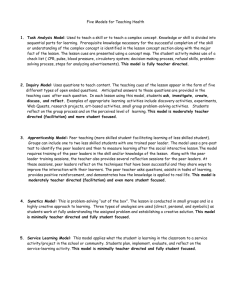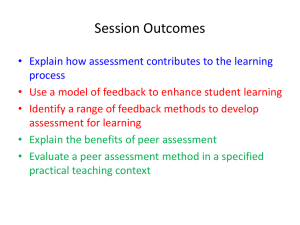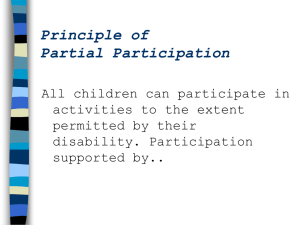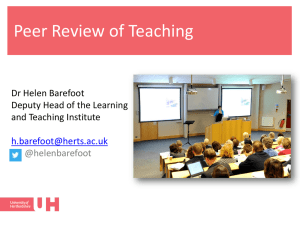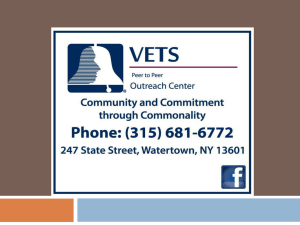Recovery Approach - Voluntary Norfolk
advertisement
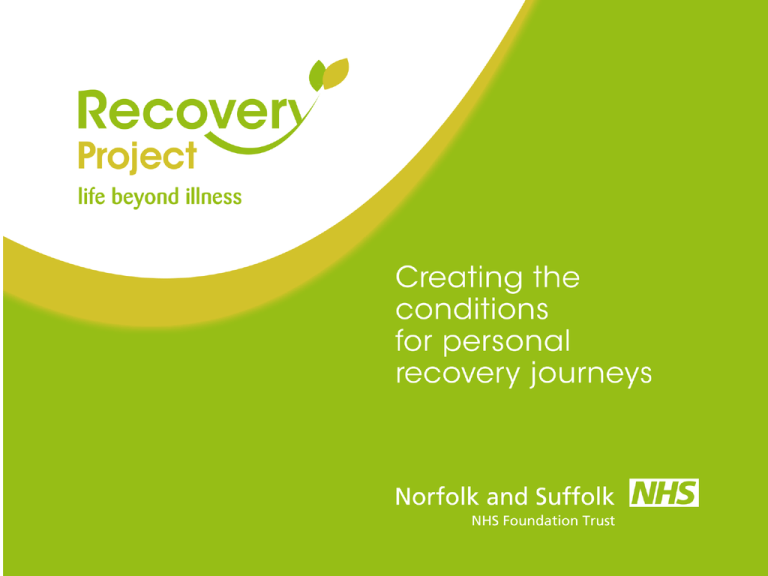
1 What does recovery mean “RECOVERY IS ABOUT BUILDING A MEANINGFUL AND SATISFYING LIFE, AS DEFINED BY THE PERSON THEMSELVES, WHETHER OR NOT THERE ARE ONGOING OR RECURRING SYMPTOMS OR PROBLEMS” SHEPHERD, BOARDMAN AND SLADE 2008 2 Drivers for change. • More people who develop mental health problems will have a good quality of life – greater ability to manage their own lives, stronger social relationships, a greater sense of purpose, the skills they need for living and working, improved chances in education, better employment rates and a suitable and stable place to live’. • No Health without Mental Health DoH. 2011 3 NSFT Recovery Project approach 4 Recovery colleges • A therapeutic approach … • • • • • Focuses on problems deficits and dysfunctions Focus on ‘fixing people’ ‘Expert’ professionals know best and prescribe what is good for ‘patients’ Problems are defined, and the type of therapy is chosen, by the professional ‘expert’ Maintains the power imbalance and reinforces the belief that all expertise lies with professionals • • • • • • • • An educational approach … Focus on growth and development – moving forward, discovering your talents, developing your skills, pursuing your ambitions Focus on helping people to become experts in looking after themselves Recognises expertise of lived experience and professional expertise in co-produced courses Training replaces therapy Patients become students Selecting courses from a prospectus replaces prescribing and referring Staff become coaches who help people to find their own solutions. 5 NSFT Recovery college • All Courses Co produced, Co delivered and Co received. • First courses commencing october 2013 • 7 courses ranging from ½ day – six, ½ days. • Building capacity to grow in second term and beyond. • Hub and spoke model. 6 Peer Support Workers “Peer support is a system of giving and receiving help founded on key principles of respect, shared responsibility, and mutual agreement of what is helpful. Peer support is not based on psychiatric models and diagnostic criteria. It is about understanding another’s situation empathically through the shared experience of emotional and psychological pain. When people find affiliation with others whom they feel are “like” them, they feel a connection. This connection, or affiliation, is a deep, holistic understanding based on mutual experience where people are able to “be” with each other without the constraints of traditional (expert/patient) relationships”. Sheryl Mead – Defining Peer Support (2003) Independent Peer Support Consultant & Trainer (USA) 7 Peer Support Workers • Benefits for Peer Workers • As beneficial for the Peer Support Worker as those whom they help – shift from ‘patient’ to ‘employee’ and able to use their skills to assist others ... Including the general benefits of being employed - financial, social, status, structure, decrease in relapse. • Increased self-esteem, confidence, empowerment. • • • • • Progress in personal recovery - skills learnt on the job aid their own recovery Benefits for Services Improved communication – help staff and patients to understand each other better Reduction in staff workload - complement work of other members of the team Changes in attitudes – too often staff only see people when they are at their most distressed Peer Support Workers offer images of possibility for staff as well as people using services Promotes recovery-focused practice – changes in the way the team think and talk about people with mental health problems Breaks down barriers between us and them • • 8 Peer Support Workers for NSFT • November commence co production of training plan. • November onwards Staff and team training commences. • January –february recruitment process for students. • March commence course. • June first Peer Support worker posts advertised. 9


